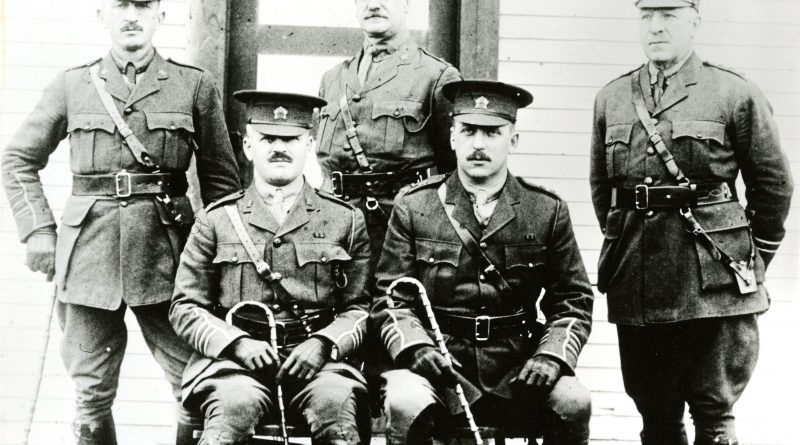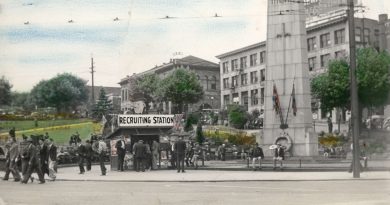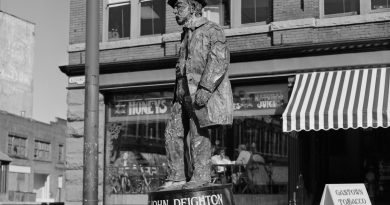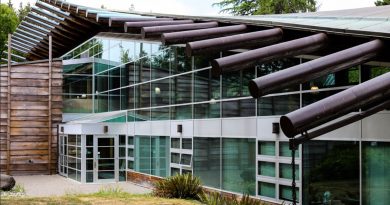1916
Above: Colonel Tobin and other soldiers in the 29th Battalion of the Canadian Expeditionary Force
[Image: Vancouver City Archives CA CCOQ C6-S01-C6.a]
*****************************************
You’ll note that these years include events listed under “Also in . . .” These are events for which we don’t have a specific date. If YOU know the specific date of an event shown there, please notify us . . . and cite the source! Many thanks!
*****************************************
February 14 The first trans-Canada telephone call—it was between Vancouver and Montreal—was placed. The circuit ran 6,763 kilometres through Buffalo, Chicago, Omaha, Salt Lake City and Portland, Oregon. Not until 1932 was a telephone line for an all-Canada connection completed.
March 8 This was proclaimed Sock Day in Vancouver. The IODE (Independent Order, Daughters of the Empire) had asked for socks for men at the front.
April 21 The first congress of the new British Columbia Chess Association began in Vancouver. The winner of the tournament was entitled to be called the “Chess Champion of British Columbia.” J.M. Ewing, a Scot by birth, was the first champion.
May 4 The first convocation for conferring of degrees was held by UBC.
May 16 The Vancouver World had an item about the new post office—Postal Station C—opening today at 15th Avenue and Main Street. Today’s it’s known as Heritage Hall, home of several community organizations and a meeting hall for local events.
June 2 The Buzzer, that publication you get on the trolleys and SkyTrain in the lower mainland, began publishing.
July 17 Lumberman John Hendry died.
Also July 17 Ranjit Mattu, star Vancouver athlete, was born in Jullunder, Punjab, India.
July The second Hotel Vancouver, a spectacular building, opened. There is a good article on it by Imbi Harding in the October 12, 2001 Vancouver Sun, Page B5. It had a brief life as a hotel, closing in May of 1939 when the present Hotel Vancouver opened.
Labor Day Two PGE trains collided in West Vancouver. One of them, the No. 2, built in 1910 in Philadelphia, was restored and is now at the West Coast Railway Heritage Park near Squamish.
September An application by Miss Rose Peers for membership in the North Vancouver Board of Trade created controversy. However, she was finally accepted as the first female member.
Fall The Hoffar Brothers, Henry and Jimmie, were building a “hydroplane,” as seaplanes were then called, the design copied from a photo of an Avro biplane they had seen in the British periodical Flight. Jimmie taught himself how to fly it.
November 8 June Hovick was born in Vancouver. As June Havoc, she became a well-known actress. Her sister was Gypsy Rose Lee, who was born in Seattle. In the musical Gypsy the character Baby June is based on June Havoc.
November 23 Harlan Carey Brewster is elected Premier. Two other decisions by B.C.’s voters this day were notable: we approved Prohibition in the province, to come into effect July 1, 1917, and we also approved giving women the vote. Brewster died in office March 1, 1918.
December 13 Canadian Pacific opened its five-mile-long Connaught Tunnel beneath Mount MacDonald at Rogers Pass. The avalanche-plagued route over the summit of Rogers Pass is abandoned. (An avalanche here March 4, 1910 had killed 62 workmen.)
December 17 Frank Griffiths, radio and TV station owner, sports executive, was born in Burnaby.
Also in 1916
Vancouver aldermen voted to open civic offices to women.
Holy Rosary Church, built in 1910, became a cathedral.
The Vancouver Institute was founded to offer lectures during the winter term. It is still going strong. Lectures are held on the UBC campus during the fall and spring academic terms.
A little-known episode in the life of Vancouver’s Major James Skitt Matthews: while he was in hospital in London, England recovering from severe war wounds, Matthews conceived of a method of compressing paraffin wax and sawdust into walnut-sized pellets, which could then be ignited and give off enough heat to boil a quart of water. Matthews called them “Fire Cubes”. The Anglo-American Oil Co. made and sold millions, but without profit. Then the army’s commander-in-chief, Earl Haig, ordered Matthews to supply enough for one army to test in the trenches. But then the war ended and demand for the “Fire Cube” flickered out. Some 17 years later Matthews would become Vancouver’s first city archivist.
Ma Murray, the famous newspaper publisher, and her family moved to the Ioco area (briefly). In 1921 they would move back to Vancouver.
Malcolm McBeath, 35, was elected mayor, one of the city’s youngest.
The first grain elevator was built in Vancouver.
Fred Deeley, Sr. acquired the Harley-Davidson franchise here, becoming its second oldest dealership.
Actor John Drainie was born in Vancouver. Orson Welles called him the greatest radio actor in the world. He died in October 1966. There is a good brief bio here.
The City passed a by-law reducing the number of aldermen per ward from two to one. Until this year, aldermen hoping to be elected by a particular ward had been required to live in that ward, but a new by-law eliminated this requirement.
John Ridington (born in West Ham, England), hired by UBC as a cataloguer in its library in 1914, was appointed the university’s first librarian. In seven years he will expand the holdings from 700 books to 55,000. By the end of his term of office there were 125,000 volumes.
Surrey Council hired its first woman employee. Miss C.E. Bauer worked in the Collectors and Assessors Office.
The people of the Squamish Nation, who have lived on Howe Sound, the Squamish River and Burrard Inlet, migrated to the inlet for jobs and consolidated into one band. The Halkomelem people of the Burrard Reserve, who have a different Coast Salish language, do not join them, although the two groups have many links.
West Vancouver began its municipal bus service, which would become known as the “Blue Buses.”
The first annual Regatta was held at Dundarave pier in West Vancouver.
The Dewdney Trunk Road reached Deroche.
Thomas Haney, after whom Haney was named, died.
The mainland portion of Eburne was renamed Marpole, after CPR official Richard Marpole. He lived at the time on Marpole Avenue. So now we have Richard Marpole, living on Marpole Avenue in Marpole.
Thomas George Shaughnessy, president of the C.P.R. from 1898 to 1918, became Lord Shaughnessy. Vancouver’s Shaughnessy neighborhood is named for him.
The Dollar Mill at Roche Point on Indian Arm began operations. Started by shipping magnate Robert Dollar, the mill was a major employer for many years, but closed in 1942.
The responsibility for street planting of trees, etc., in Vancouver passed to the Board of Parks and Recreation.
Stanley Park’s Lost Lagoon became landlocked, an artificial lake created by construction of a causeway. It got its curious name (now inaccurate) from poet Pauline Johnson, who remarked how the lagoon disappeared at low tide.
Industrial construction began on Granville Island. It was 36 acres in size, 10 feet above highwater mark, had 80 lots and rents were $500 to $1,500 an acre a year.
Construction began on the Pantages Theatre on Hastings Street. It will be finished in 1917. (It was demolished, replaced by a parking lot.)
Thomas Carlyle Hebb is appointed a Professor of Physics at UBC. He will serve to 1938. The university’s Hebb Building is named for him.
The Mabel Brown was built in North Vancouver for the Canada West Coast Navigation Co. She was a wood-hulled, five-masted auxiliary schooner. The Mabel Brown name was given to a class of lumber-carrying sailing ships built on the Pacific coast. Eighteen were built.
The UBC Botanical Garden was established, the oldest university botanical garden in Canada, today featuring 70 acres of plants from around the world, set in a coastal forest, including 400 species of rhododendron.
Mussoc (the University of British Columbia Musical Theatre Society ) was formed. Mussoc alumni include Ruth Nichol, Jane Mortifee, Brent Carver, Richard Ouzounian, Jeff Hyslop, Patrick Rose, Ann Mortifee, Victor Young, David Y.H. Lui and Margot Kidder.
The UBC Player’s Club was also born and was one of the city’s only theatre troupes for much of the city*s early history.
The Vancouver Shakespeare Society was formed.
Eric Hamber became president of B.C. Mills, Timber and Trading.
Charles R. Shaw, the first reeve of Burnaby, died at age 82 in Ann Arbor, Michigan.
A proposal was put forth for a dam and two sets of locks for Second Narrows, simplifying the bridging problem, and eventually making the upper harbour into a freshwater lake, with a canal east to Pitt River. You may have noticed this was not built.




